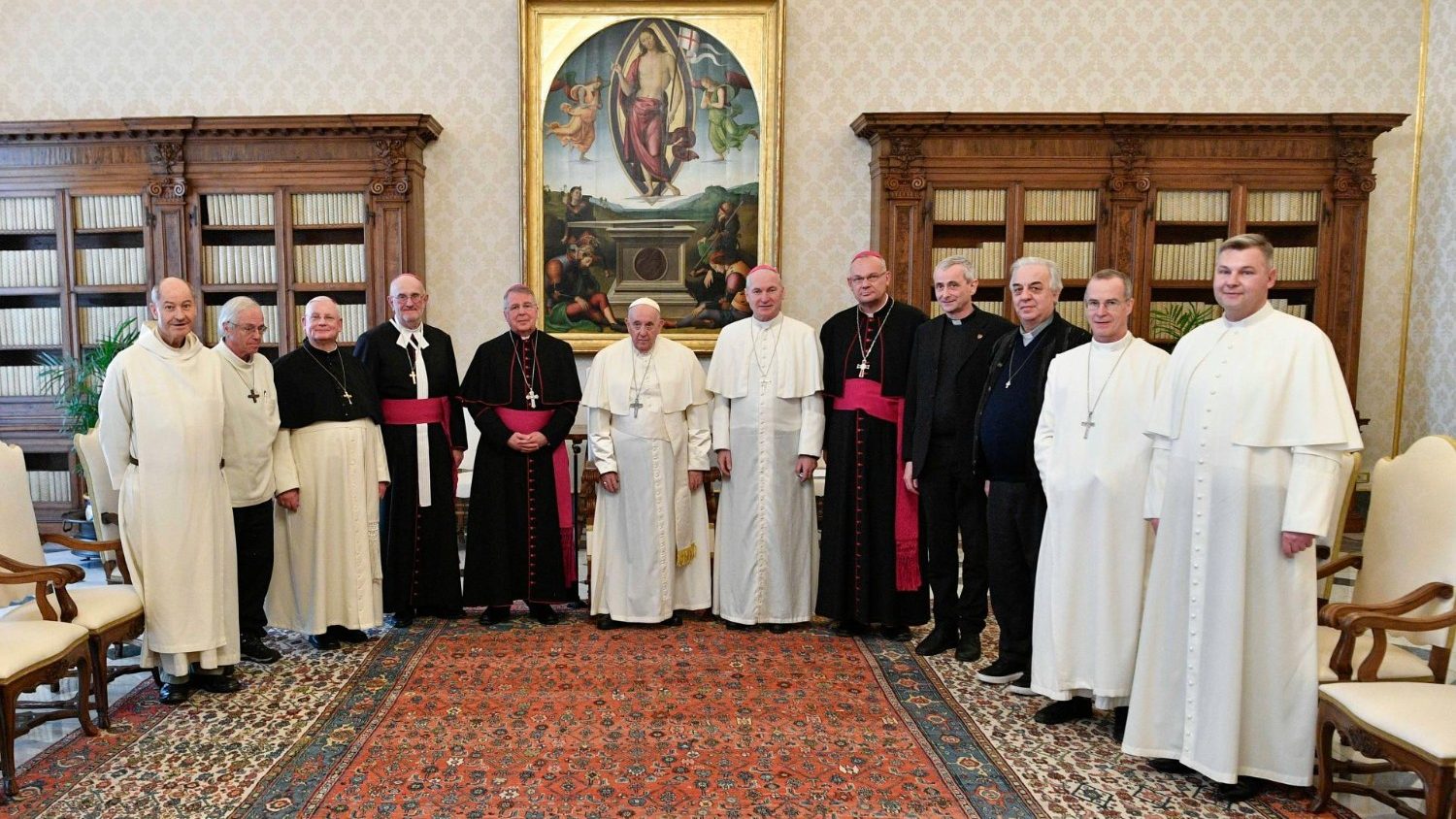In the audience with the Primatial Council of the Confederation of Canons Regular of Saint Augustine, Francis recalls that consecrating oneself to God means making the Gospel one’s rule of life, loving Christ and the Church his body: the congregations do not isolate themselves, but live in the present opening up to the future. The spirituality of encounter, listening and dialogue is essential for synodality
Tiziana Campisi – Vatican City
The fundamental rule of religious life is the following of Christ proposed by the Gospel. Assuming the Gospel as a rule of life, to the point of being able to say with Saint Paul: “I no longer live, but Christ lives in me”.
Pope Francis reiterates this assumption speaking to the Primatial Council of the Confederation of Canons Regular of St. Augustinereceived in the Library of the Apostolic Palace, and asks religious to make the Gospel their own handbook and not to reduce it to an ideology, so that it always remains spirit and life. (Listen to the service with the Pope’s voice)
The Gospel continually brings us back to placing Christ at the center of our life and our mission. It takes us back to “first love”. And loving Christ means loving the Church, her body. Consecrated life is born in the Church, grows with the Church and bears fruit as the Church. It is in the Church, as St. Augustine teaches us, that we discover the total Christ.
The search for God
Then, addressing more directly the canons regular of Saint Augustine, the Pope recalls man’s longing for God described by the bishop of Hippo in the Confessions and explains that “God made us for himself and our hearts are restless until rest in Him”. For this reason, the regular canons dedicate themselves mainly to the “constant and daily search for the Lord”. Above all in community life, because the koinoniai.e. communion and fraternal relationship, makes “all builders, weavers of fraternity”.
Seek the Lord in the assiduous reading of Sacred Scripture, in whose pages Christ and the Church resound. Seek the Lord in the liturgy, especially in the Eucharist, the culmination of the Christian life, which signifies and realizes the unity of the Church in the harmony of charity. Look for him in study and in ordinary pastoral care. Seek him also in the realities of our time, knowing that nothing human can be extraneous to us and that, free from all worldliness, we can enliven the world with the leaven of the Kingdom of God.
The journey of interiority at the school of Sant’Agostino
But the search for God “presupposes the journey of interiority, of knowledge and love of the Lord, in the school of Saint Augustine”, warns Francis, who cites the invitation of the bishop of Hippo to find oneself in one’s own interiority – “not go out of yourself, constantly go into yourself; truth dwells in the inner man” – to explain that there the light of Christ “illuminates temporal realities for us”.
The confederation of congregations as an instrument of synodality
The Pope also reminds the regular canons of Saint Augustine of the importance of their Confederation, established by John XXIII in 1959 and aimed at fostering communion between congregations that share the same charism. He underlines the objectives of the organization and among these the mutual help between congregations, “as regards the spiritual dimension, the formation of young people, ongoing formation and the promotion of culture”. And he explains, Francis, that through the confederations the isolation of the individual congregations is avoided, which is dangerous.
Great care must be taken to protect oneself from the disease of self-referentiality and to safeguard the communion between the different Congregations as a true treasure. You are well aware that you are all in the same boat and that “no one builds the future by isolating themselves or only with their own strength, but recognizing each other in the truth of a communion that is always open to encounter, dialogue, listening and mutual help ”. Practicing the spirituality of encounter: this is essential for living synodality in the Church.
Adapt to the circumstances of the time
And then, the Pope specifies, consecrated life “must adapt to the circumstances of the time”, hence the indication to canons regular to adapt also to the different places and cultures in which they are present, “always in the light of the Gospel and of their own charisma”, because memory is good if it is fruitful, otherwise it is archaeological, “it transforms into museum pieces”, says Francis, “perhaps worthy of admiration but not of imitation”. Instead the memory of one’s own history, of roots, “the Deuteronomic memory”, the Pontiff calls it, “helps us to live the present fully and without fear in order to open ourselves to the future with renewed hope”.
Finally, the Pope exhorts the regular canons of Saint Augustine to revisit their charism and to “strengthen the communion of life following the example of the primitive apostolic community”, “an anticipation of full and definitive union in God and the way towards it”.




